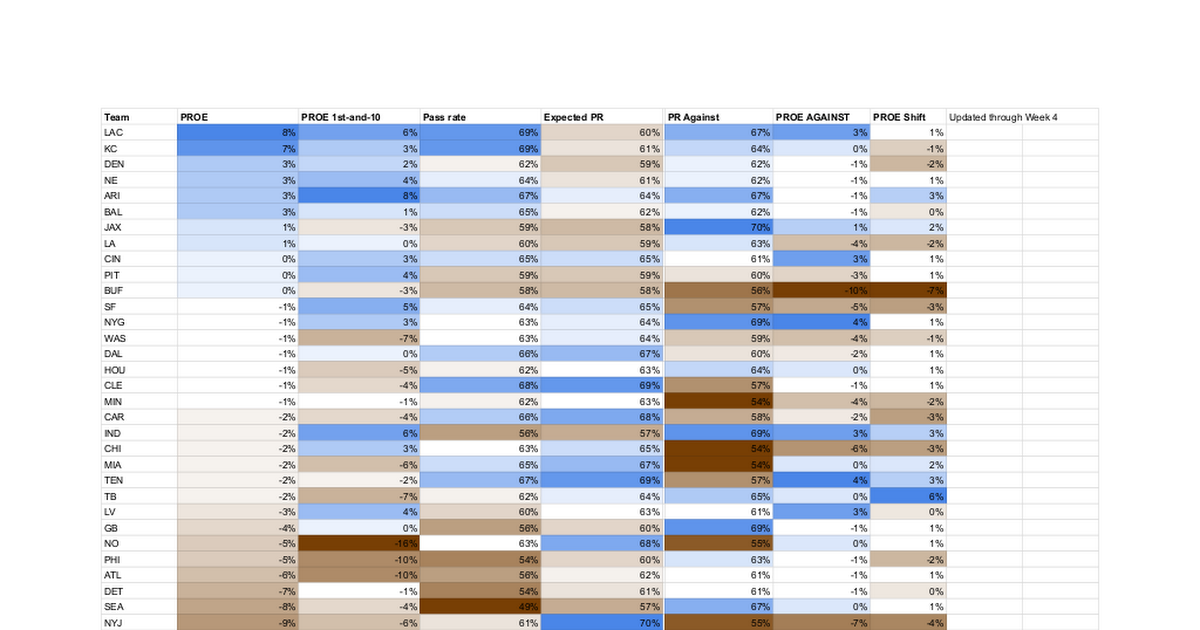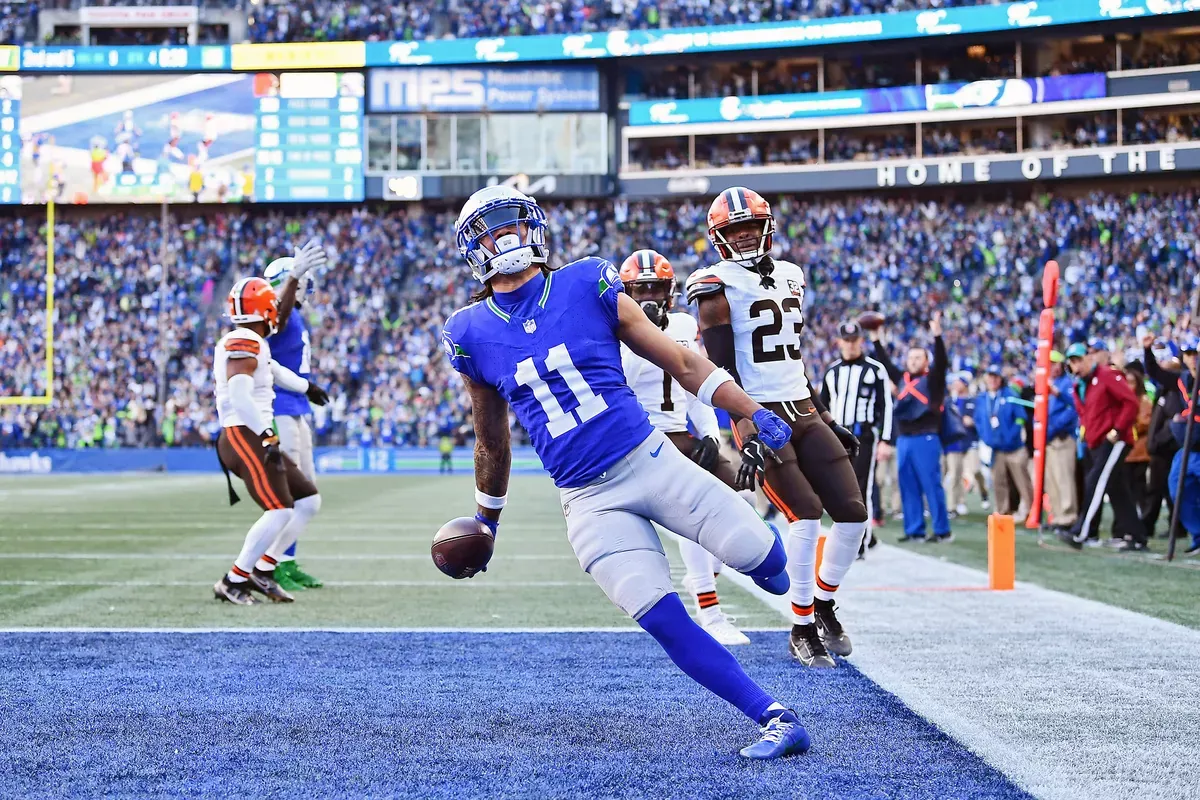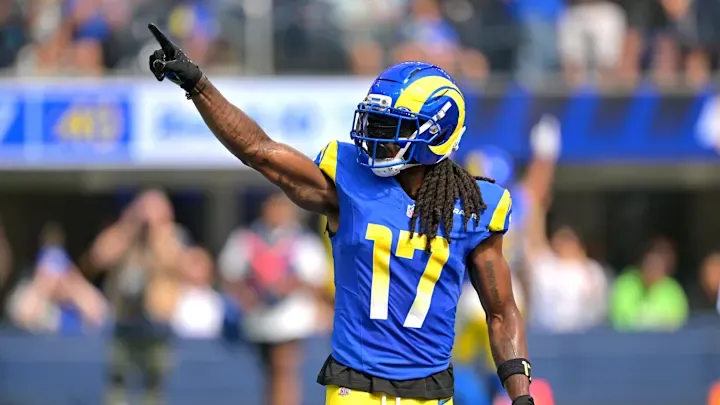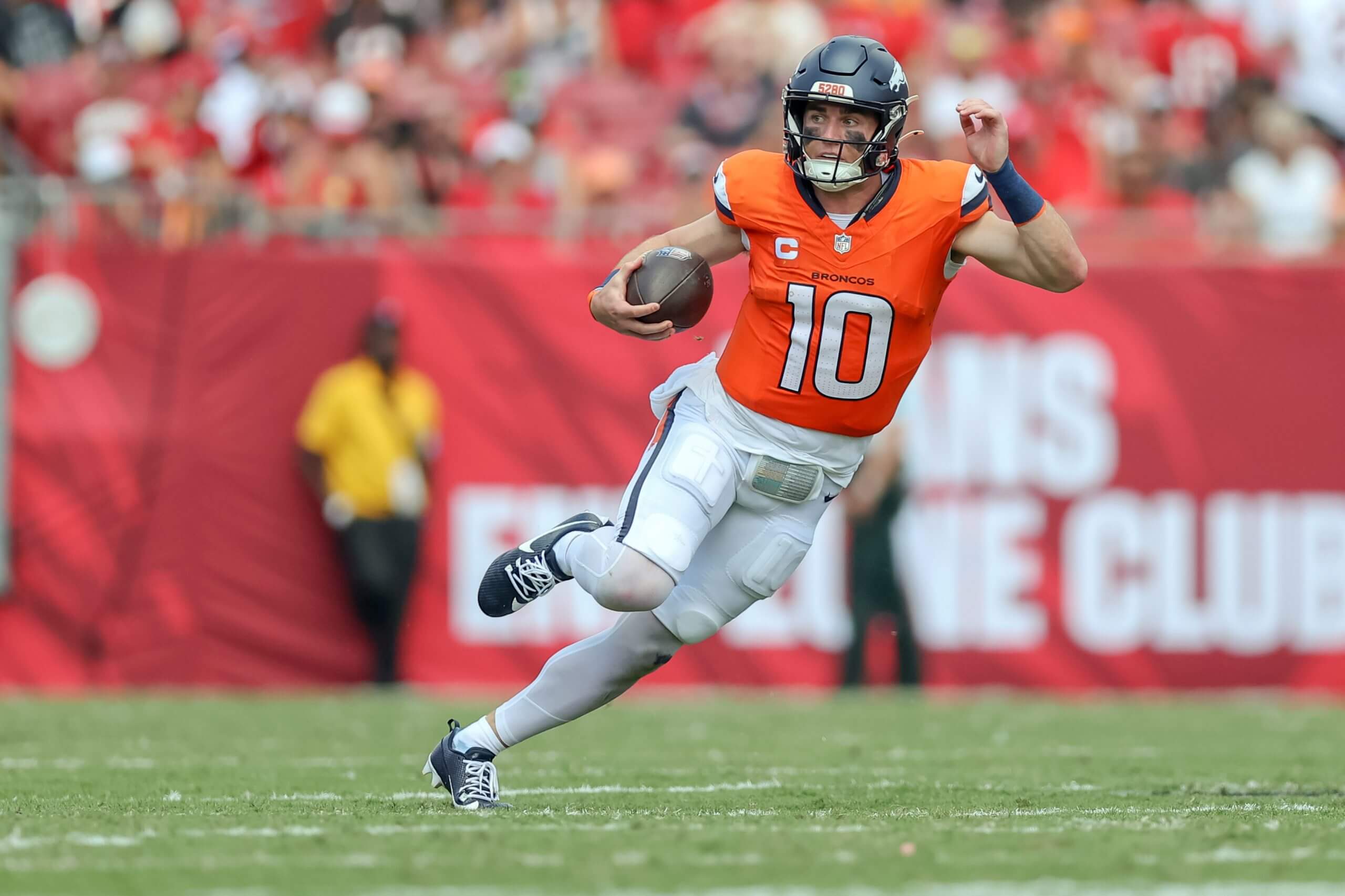
Week 6 London Walkthrough: Bo Nix Hits the Jets
Welcome to the Week 6 London Game Walkthrough.
In this article, I'll outline critical fantasy football context for a glorious morning of international football.
(The stats below are from PFF, NFLfastR, rbsdm.com, RotoViz, FantasyLabs, Fantasy Life, Fantasy Points, ESPN, FTN, and NFL Next Gen).
PROE data is available for subscribers at the bottom of the post.
Broncos at Jets, 9:30 AM
Broncos
Implied Team Total: 25.5
Bo Nix ranks QB22 in EPA per game, but as part of a tightly packed group. He's less than 1.0 EPA per game behind Jayden Daniels, who is QB17. Nix's efficiency has been mediocre, not bad.
But in success rate, Nix ranks QB34, behind Cooper Rush and Jake Browning and ahead of only Caleb Williams, Russell Wilson, JJ McCarthy, Dillon Gabriel, Cam Ward, and Joe Flacco. Nix's success rate is a significant concern because between it and EPA, success rate is the the more likely of the two to be telling the real story. Put another way, Nix is a negative regression candidate.

However, among QBs with similar success rates, Caleb Williams stands out to me. Nix doesn't resemble Williams in his on-field playstyle, but statistically, they are both boom/bust. They are the types of QBs where you have to be willing to accept a low weekly floor.

At the same time, Nix, like Williams, is the type of QB who can really pop in the right matchup.
The Jets' defense provides just such a ceiling opportunity.
The Jets are very poor in coverage and will be without CB Michael Carter in this game. They may also be without CB Brandon Stephens, who popped up on the injury report late in the week with a neck injury. He's officially questionable.
The Jets are also missing starting LBs Marcelino McCrary-Ball and Quincy Williams.
The Jets also have a very poor pass rush.
This is... not a good pass defense.

The Jets have also been very poor at defending play action, despite seeing a ton of it. Meanwhile, the Broncos use play action at one of the highest rates in the NFL.

All in all, this is an excellent spot for Nix's efficiency. Volume is the bigger question.
The Broncos have a slight lean to the pass this year, with a 2% PROE. We've also yet to see them really lean into the run in a game this year.

So there should be a decent floor here in terms of pass volume—the Broncos are unlikely to go full ground and pound. There's probably also a ceiling on their passing volume, though. Unless, that is, the 7.5-point underdog Jets are unexpectedly competitive here.
That ceiling is driven by the fact that the Broncos should be in positive game script for much of this game, and by the fact that the Jets are a major run funnel.

The Jets have a middling run defense, but they're frequently trailing. The Jets' 70% expected pass rate is the highest in the NFL.

This has allowed teams to pound the rock against them. In Week 1, the Steelers trailed for most of the game and posted a 65% pass rate. But from Week 2 on, Jets opponents have averaged just a 52% pass rate. Basically, when you play the Jets, you play like the Seahawks offense.

This is a good setup for JK Dobbins, who has been the Broncos' primary ball carrier this year and has run well. He has a TD-dependent fantasy profile, but he has a good chance to hit paydirt here. He's a high-end RB3.
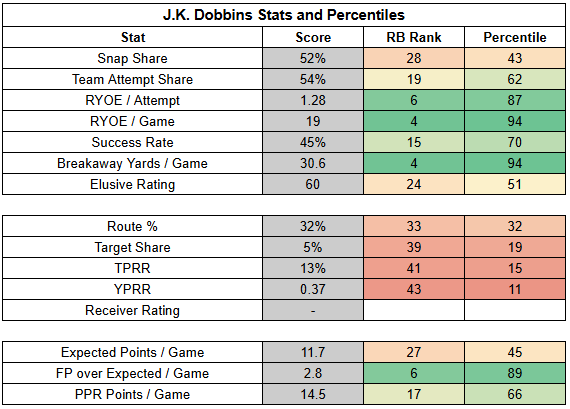
RJ Harvey remains in a rotational role and actually took a step back in workload against the Eagles last week.

He's shown some explosiveness, but just isn't on the field enough to be more than an upside RB4.
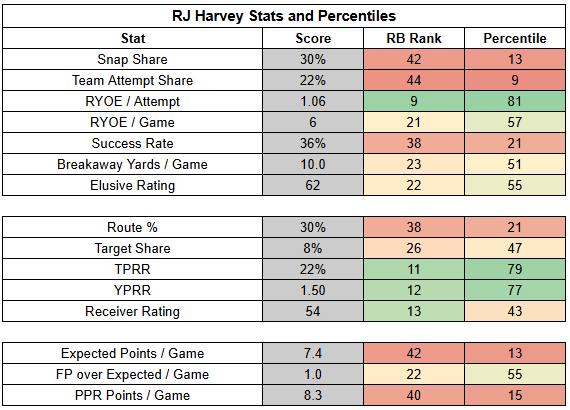
Even with volume concerns for the passing offense, Courtland Sutton looks like the safest bet among the Broncos' skill players. His routes are locked in, and he's seeing targets at a steady rate.

Sutton isn't a dominant No. 1 target, but he's clearly installed as the Broncos' No. 1.

Sutton is also likely to benefit from the Jets' above-average use of man coverage.
The Jets are playing man on 31% of their dropbacks. And against man, Sutton is averaging a 35% TPRR with 2.58 YPRR.
The Jets also don't double-cover all that often. And when in single coverage—either man or zone—Sutton is averaging a 25% TPRR and a 2.62 YPRR.
There's also little need to fear Sauce Gardner, whose reputation doesn't match his current level of play. Gardner has allowed 170 yards in primary coverage this year on 154 coverage snaps. That rate puts him just 71st among 121 qualifying corners. Gardner isn't bad, but QBs haven't been afraid to throw at him.
And with Michael Carter ruled out and Brandon Stephens questionable, Sutton should be in good shape when not facing Gardner.
Sutton is a WR2.
Troy Franklin's routes aren't as locked in as Sutton's, but he's settled into a near-full-time role.

Marvin Mims is trending toward being a rotational player.

Franklin's target profile isn't impressive, but like Mims, he's involved in the screen game. He's also drawing double coverage downfield, which is a practical, real-life skill that should help keep him on the field.
In a matchup where Nix could be very efficient, Franklin is a WR4.

Evan Engram has a solid 20% TPRR, but he just isn't on the field enough to be a reliable fantasy option.

Engram is a low-end TE2.
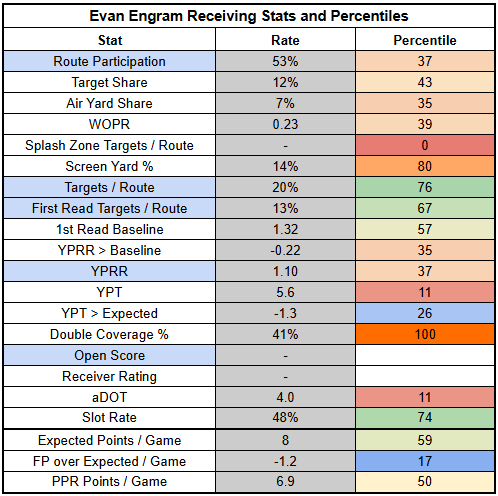
Jets
Implied Team Total: 18
If you made me pick just one stat to describe Justin Fields, it would be his time to throw. Per NFL Next Gen, only Caleb Williams (3.17 seconds) has a slower time to throw than Fields (3.09 seconds).
Fields' long time to throw generates a lot of the other parts of his game that we're more familiar with. He's constantly under pressure... in part because he hangs onto the ball. He's a great running QB... largely because he scrambles after holding the ball for a while. He's matchup-dependent... partly because his tendency to hold the ball hurts him most against good defenses.
When Justin Fields targets his first read, he's not taking that long. His 2.83-second time to throw is only the eighth slowest, ahead of Jaxson Dart (2.84), Jalen Hurts, Bo Nix, Jayden Daniels, Lamar Jackson, Caleb Williams, and JJ McCarthy (3.10). It's a stat that definitely tells you something about him, but it's not defining.
But on non-first-read throws, Fields has an absurd 3.81-second time to throw. That's the slowest in the NFL this year and slower than every QB in 2024. In 2023, three QBs took longer... Justin Fields (3.84), Lamar Jackson (3.86), and Joshua Dobbs (4.07).
This is clearly part of the Justin Fields experience and could make his life very difficult in this week's matchup.
The Broncos are the most efficient defense in the league against first reads. They also have an elite pass rush capable of making opposing QBs pay for holding onto the ball too long. They also force the issue by blitzing at a high rate.

It's also not hard for opponents to figure out who Justin Fields' first read is. By and large, he's looking for Garrett Wilson. Defenses know this, which helps explain Field's 48% first-read attempt rate—the lowest in the league.
Going against Pat Surtain this week, it's hard to see that increasing significantly.
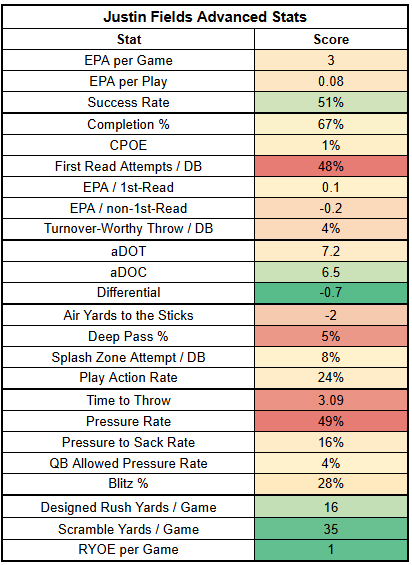
This isn't to say that Fields is a terrible QB. I'm generally a Fields apologist.
For example, I feel compelled to note that Fields has been better than you might assume in EPA per game (QB19) and success rate (QB6) this year. Technically, he's a positive regression candidate.

My view is that Fields has some rare strengths. People sometimes forget that when discussing his weaknesses. But... those weaknesses are real.
And as we saw against the Bills, when things go off the rails, it can get ugly.

This week's matchup creates legitimate implosion potential for Fields and the Jets.
But last week's matchup with the Cowboys did offer some hope, especially if counting on Fields and the Jets to put up fantasy production in garbage time.
For the first time all season, the Jets were legitimately pass-heavy.

Against the Cowboys, the Jets had a 70% expected pass rate, matching their season average—which is absurd. For the first time with Fields, they leaned into the negative game script, posting a 75% pass rate.

That's the type of approach we're looking for this week. Otherwise, it could be a rough outing for the passing game.
For the Jets, the receiving game is named Garrett Wilson. Wilson is dominating targets by getting open at an elite rate and being the only WR with a pulse on the Jets.
Given the matchup, he's just a WR2, but he has WR1 upside given his outrageous role, which he's actually been performing very efficiently on.

Josh Reynolds is currently the Jets' WR2, but it's a big "who cares" from me.

Mason Taylor's role in the offense has been growing in recent weeks, and he is starting to look like a reliable-ish play.

Taylor isn't very efficient, but he's clearly the No. 2 receiver in the downfield passing game. He's a high-end TE2.
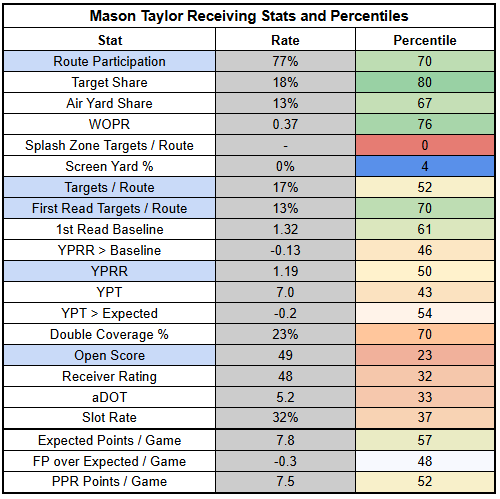
With Braelon Allen out, Breece Hall saw his first impressive carry share of the year, with a solid 64% mark. He also maintained a solid role in the passing game.

Hall was ripping off long runs left and right against the Cowboys, although he did have a costly fumble. Still, Hall now leads all RBs in breakaway yards per game. He's also been a very efficient receiver. The burst is clearly there.

Hall has struggled with consistency a bit and will be attached to a passing offense that is very likely to struggle this week. Even if the Jets return to the comically run-heavy approach they operated with against Miami, Hall's production is likely to be stifled by the Jets' inability to sustain drives.
At the same time, he's a talented RB with a receiving role going against a good-not-great run defense. Hall is a bet-on-talent high-end RB2.

